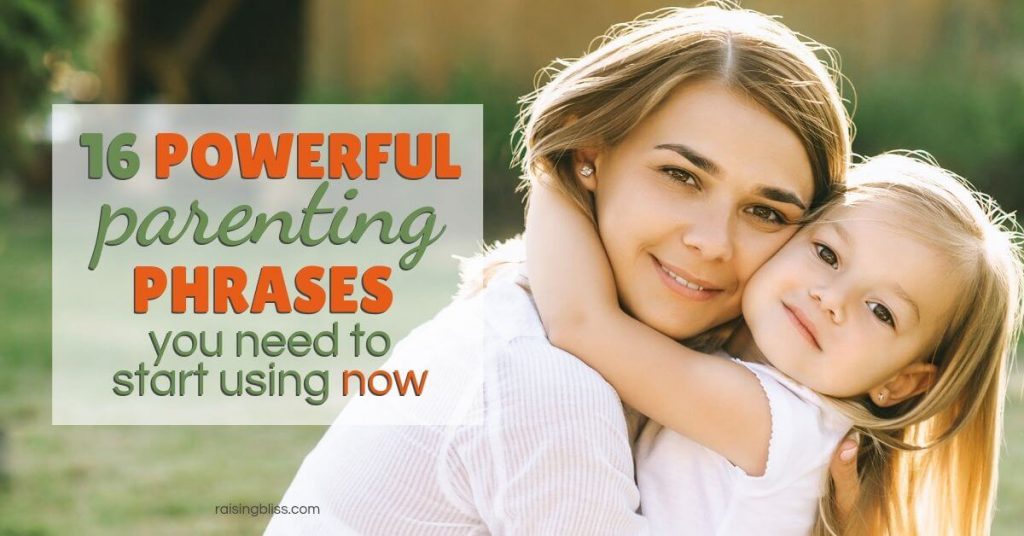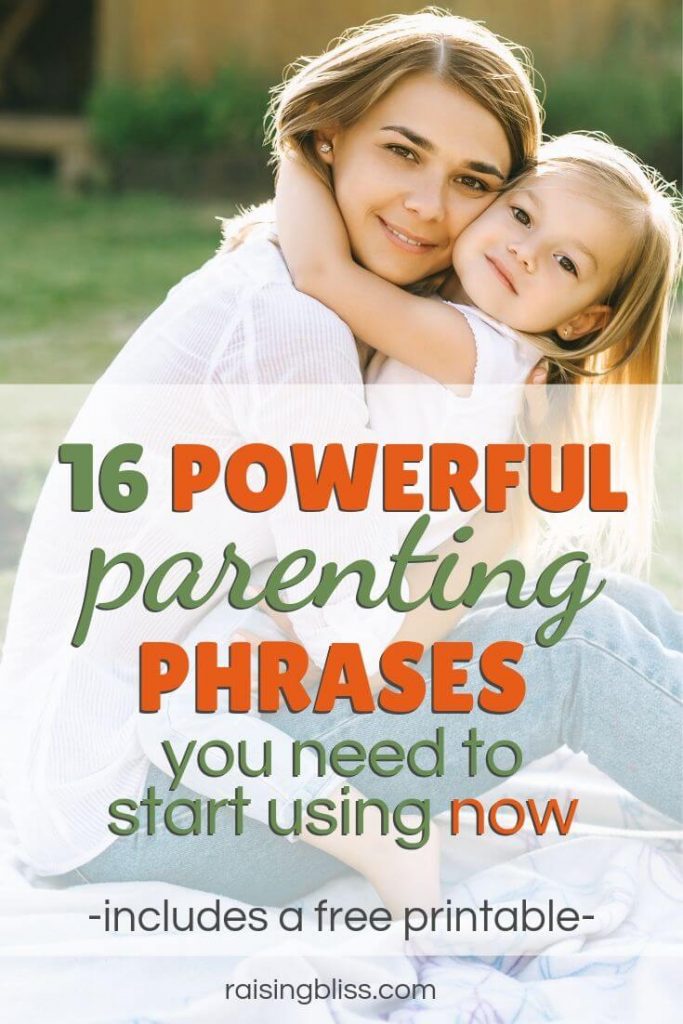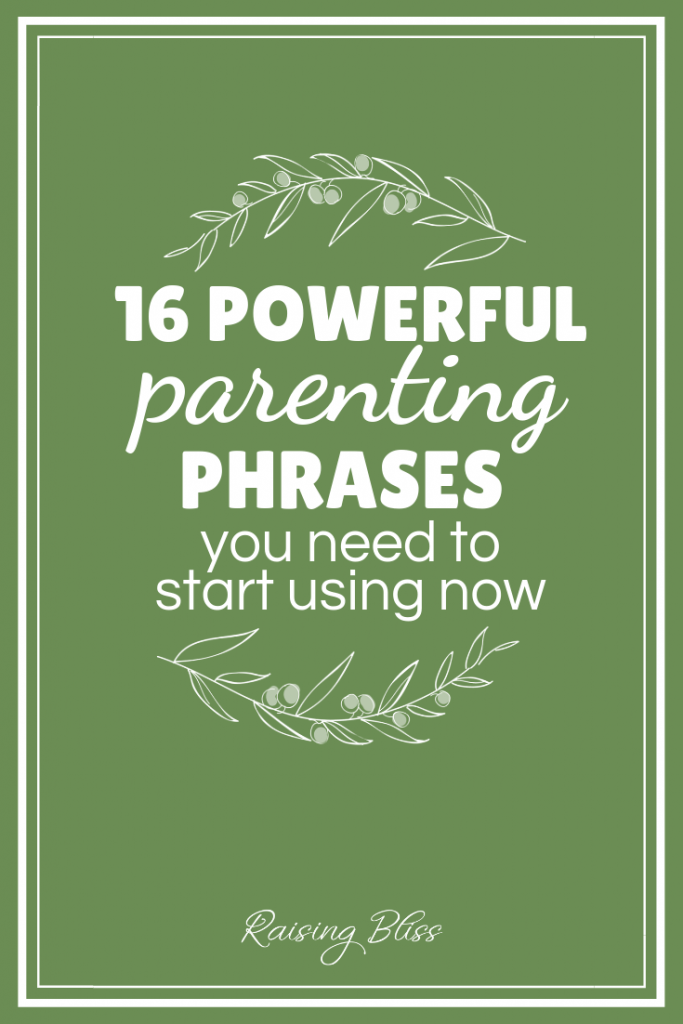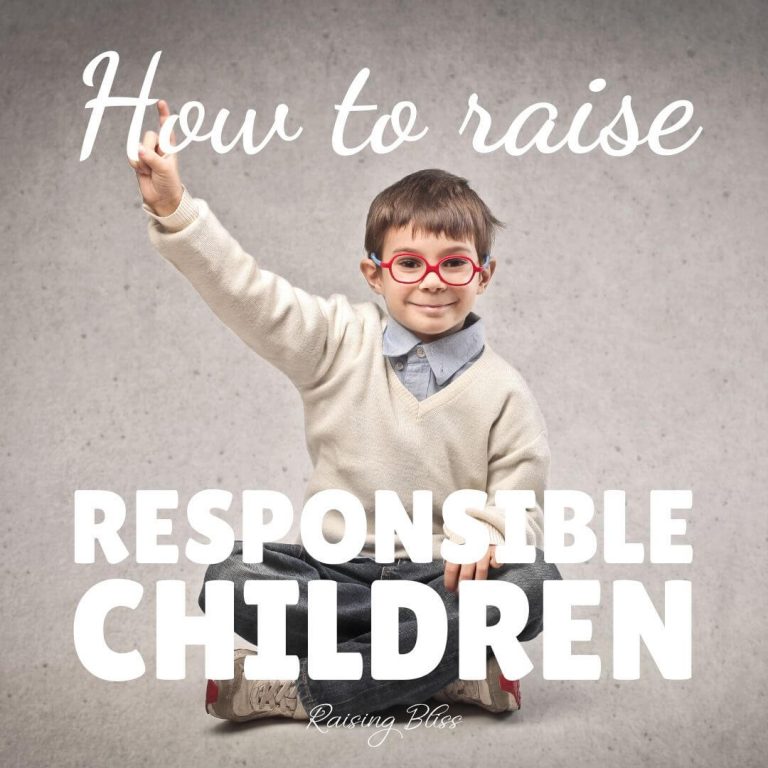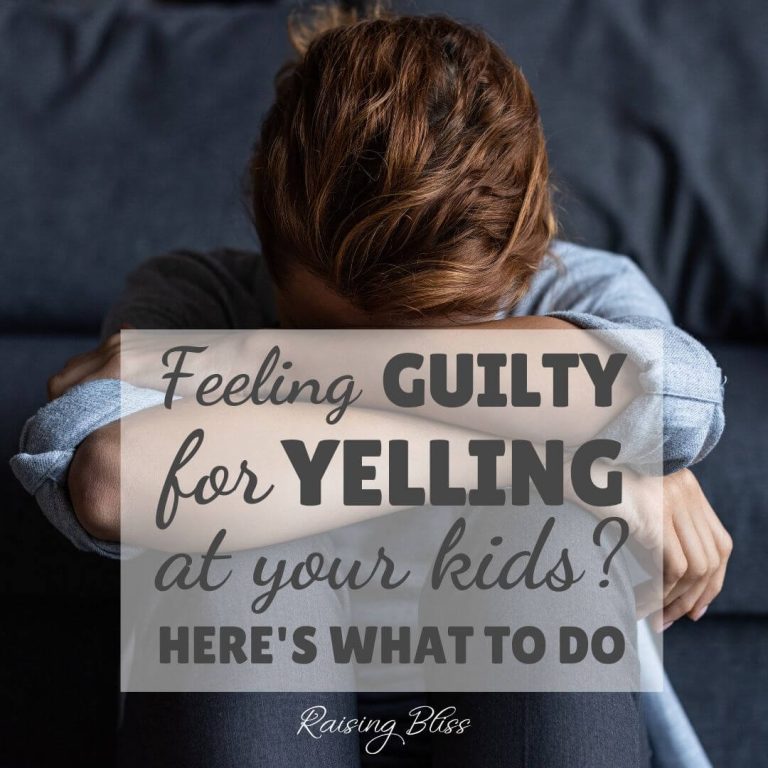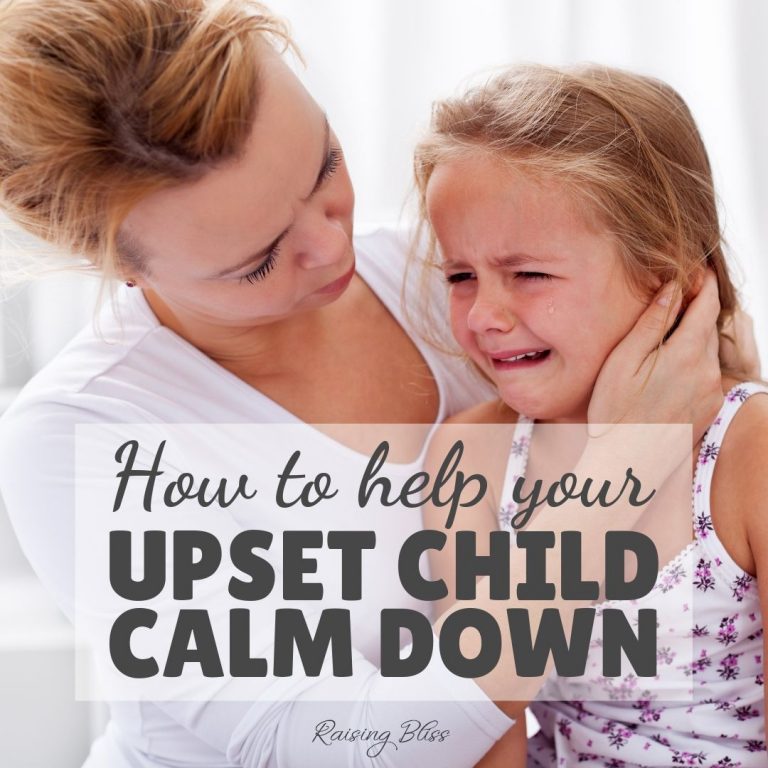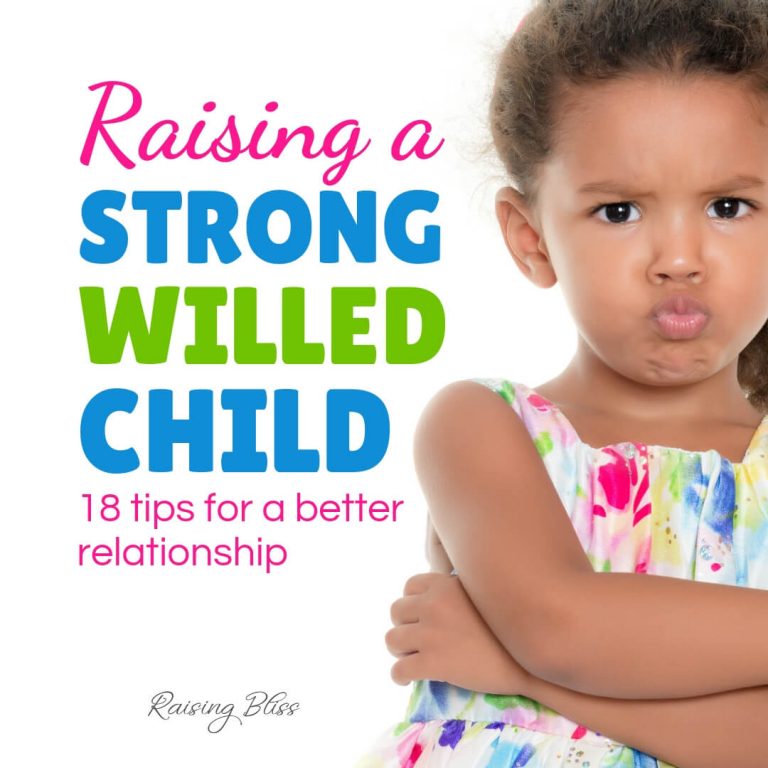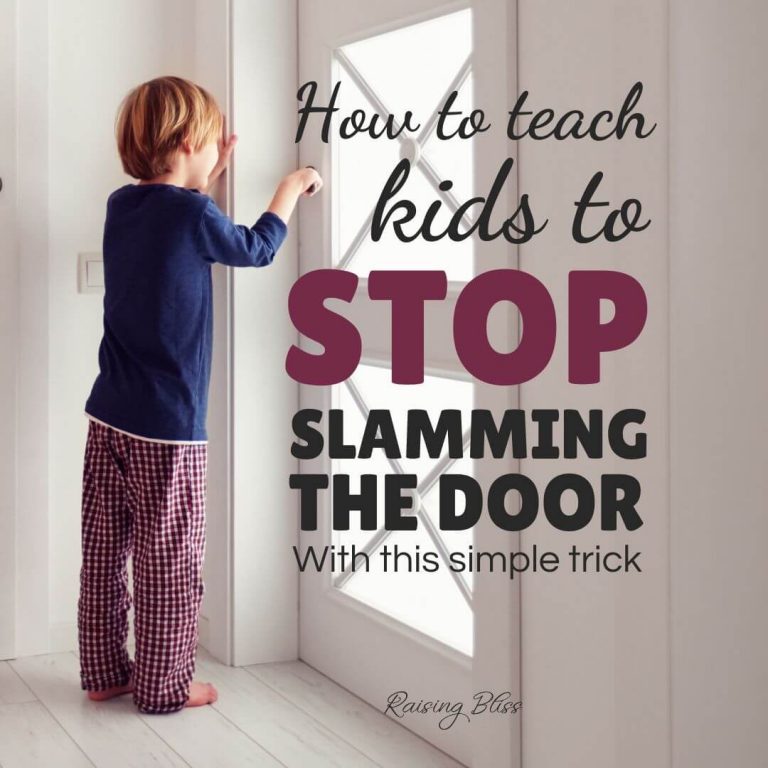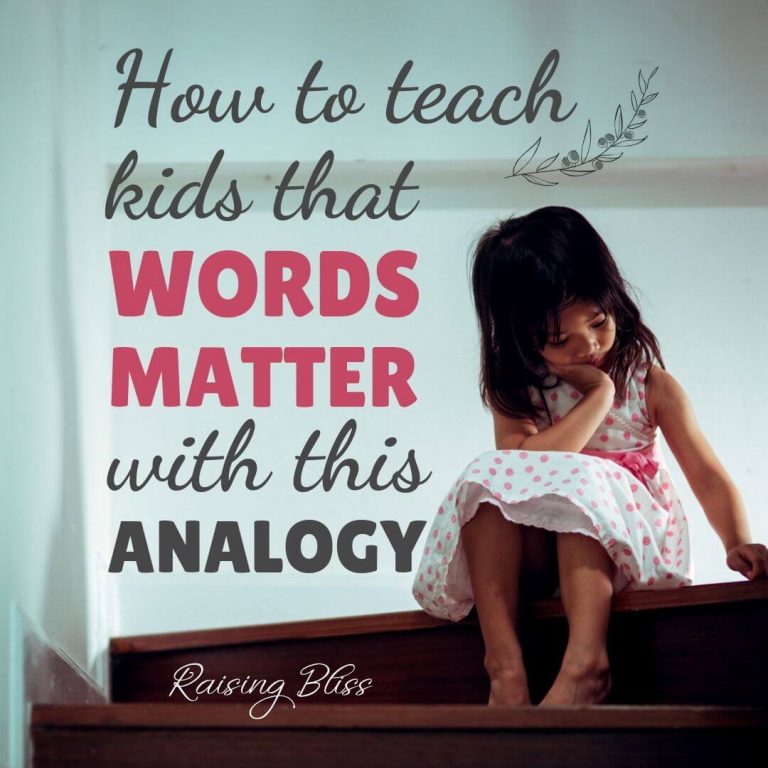16 Powerful Parenting Phrases You Need to Start Using Now
Inside: Important phrases to say to your kids that will leave a positive impact
Raising good people is no small task. Here are 16 powerful parenting phrases you need to start using now. These phrases will help with relationship building, problem-solving, and will help avoid frustration. After all, what mom doesn’t want to raise good people and stay friends with them?
1. That must have been tough!
When your child comes to you with yet another complaint, listen to his story, and say, “That must have hurt!” or, “That must have been hard.” Your child will feel understood, and that alone will make him feel much better.
Example:
My son comes to me with a complaint that he fell outside while running and now his knee hurts. While I listen to his detailed account of what happened, I examine his knee. After he’s done talking and when I’m convinced he’s not seriously hurt, I say, “Wow, that must have hurt!” while I rub his knee. “It did!” He answers over his shoulder as he runs outside to continue playing.
2. It sounds like you need a hug
Affection does wonders, and offering someone a hug even if they’ve just yelled at you is likely to diffuse the situation.
Example:
My son seems a bit more emotional than usual. He yells, “No-one wants to play with me, no-one likes me!” I turn to him, open my arms, and say, “It sounds like you could use a hug.” My frustrated, emotional son walks slowly to me and sinks into my hug, wrapping his hands around my waist. We stand like that for a minute, after which he lets go and goes on to play with his brothers.
3. That doesn’t work for me
When your child is asking for something he can’t have or does something he’s not supposed to do, instead of saying, “No”, try, “That doesn’t work for me.” This will show your child that you are expressing your feelings in a healthy way while telling him “no” gently. Here are more ideas on how to say “No” to your child in a positive way.
4. I really like the way you…
We need to acknowledge our kids’ efforts. Kind words that are general are nice, but when we’re being descriptive, our children get the true benefit of praise. Instead of saying, “You are behaving very well today”, try saying, “I really like the way you brushed the cat. You made sure she was comfortable and not scared, and you cleaned the brush afterward, thank you.” Or, “I really like the way you let your brother have the toy he wanted, even though you were playing with it yourself.”
5. Let’s talk about this in 5 minutes
When emotions are high, say this phrase and part ways with your child for a few minutes. Time will help both you and your child to calm down and regroup when you both have cooler heads. Use this phrase when you feel that the conversation is not going anywhere.
Example:
One of my boys is feeling very defiant, and no matter what I say, there’s no getting through to him. I see that we’re getting nowhere, so I say, “Let’s talk about this in 5 minutes.” To which my son furrows his eyebrows even further and crosses his arms even tighter. I walk into my room and close the door. After 5 minutes, I come out to find my previously unhappy son playing with his brothers and sister. “Are you ready to talk now?” I ask. “Yes,” he says quietly as he leaves the toy on the floor and walks over to me.
6. Let’s start over
When you feel that no matter what you do, you simply can’t get through to your child, offer a do-over. This is a great next step after you’ve both taken 5 minutes to cool down.
7. What would you do?
Asking, “What would you do?” Or “How would you fix this?” is a great way to help develop your child’s problem-solving skills. Avoid interrupting him with your corrections or telling him what to do, let him tell you how he would solve the problem first. Then, you can nudge him further with follow up questions.
8. How can we make this work?
Kids and adults alike get immune to hearing commands. “You need to do this,” and “You have to go here,” gets old very fast. When you open up the conversation with words, “How can we make this work?” Your child might offer a solution you might not even have thought of. Get him involved in problem-solving sooner than later.
Example:
The children are arguing over which park to go to. Two of them want to go to the park with the swings, and three want to go to the one with the tall slide. Everyone is buckled in the car, and I have the car stopped at the end of the driveway, waiting for them to make the final decision.
“There is a problem,” I say, “Some kids want to go to one park, and others want to go to another. Since we can’t go to two parks in one day, how can we make this work?” “We can go to one now and to another tomorrow!” Says one. “We can go to grandma’s instead!” Says another. They talk amongst themselves a little more and decide to go to Grandma’s. At Grandma’s, they agree on which park we would visit tomorrow.
9. How can I help?
As mothers, we want to jump right in and solve the problems for our children. But more often than not, that’s not what your child needs from you. Listen to him explaining the problem to you, and acknowledge his feelings. Often, your child simply needs someone to listen to him, and understand him. If your child is still upset, ask him how you can help.
10. I trust you will make the right choice
Some may argue that this phrase puts pressure on the child. I, however, think that it’s important for our children to understand that we trust them. Sometimes all we need is to say, “I trust your judgment”, and let them make their choice based on the guidance you’ve previously provided.
11. I can tell you worked really hard
We are often tempted to say something like, “You’re so smart” to our children. At first glance, there’s nothing wrong with this phrase. However, if you say it to your child, he will begin thinking that since he is naturally smart, he doesn’t have to put forth the effort. His attitude might turn into, “Why should I try hard, I’m already smart”. We need to motivate our kids to keep going when things get tough. And it starts with phrases like, “You worked really hard, and it’s paying off.”
Example:
My son shows me a drawing he just finished. I can see that for his age it’s very intricately drawn and detailed. I take the drawing in my hand, look over it and say, “Wow, I love all the detail on this page. I can see you worked really hard on it. The colors are beautiful, and I really love what you did with that squiggly thing in the corner, can you tell me what that is?” Hearing this instead of, “Wow, good job, you’re so talented!” Will motivate him to work harder next time, to add more detail, and to try different color combinations.
12. What would you do differently next time?
When you find yourself mediating a situation where your child made a poor choice, and he realizes he’s in the wrong, ask him what he would do differently next time. This phrase works well when you’re having a calm conversation with your child. It gets him thinking, and saying what he would do differently will help him remember it the next time he’s faced with the same choice.
13. What do you think the first step should be?
When your child is faced with a problem, instead of giving him the solution, try to engage his problem-solving skills and ask him what he thinks his first step should be. He may be digging in his memory trying to remember what you taught him. This phrase also engages critical thinking.
Example:
My daughter spills juice onto the kitchen floor. I’m tempted to remove her from the kitchen and clean up the mess myself. After all, she’s only 2. I fight back my first thought and say, “Uh-oh, that’s a mess! We need to clean it up. What should we do first?” “Wipe it!” She says as she runs across the puddle to reach for the paper towels. I wince and hand her two paper towel squares. She goes back to the puddle and wipes it up. She throws the now-orange paper towel pieces away and thinks she’s done.
I hand her two more paper towel squares, this time wet. She takes them and wipes the shiny juice floor with them. “Thank you,” I say as I take her to the bath to wash the juice off her feet. I come back to the kitchen and mop up the still-sticky floor and the little juicy footprints. The next time she spills the contents of her cup, she goes straight for the paper towel and cleans up after herself.
14. I love being around you
Look, I know that the reality of motherhood is, sometimes we are so exhausted that we don’t necessarily love being around our children at every moment in time. And that’s ok, we need time for ourselves to rest, recharge, and make room for self-care. But at the same time, hearing words like, “I love being around you”, will grow confidence in your child, and assure him that he is accepted unconditionally.
15. Your kind words make me feel so special
When your child gives you a pretty drawing, a note, or the prettiest rock they could find, tell him how special it made you feel. Little kids love to please, and as they grow, even though they may show it less, they still love it when parents are pleased with them.
16. I will always love you no matter what you do or say
This phrase is so important for our children to hear. Kids mess up, they break rules, they push their limits, and behind all that is a little child who is scared beyond belief that his parents won’t love him anymore. This tension may be the reason they act out and mess up even more. Ease his mind, and let him know that you will always love him, no matter what.
Keep these powerful parenting phrases handy, and use them often. Let’s raise good people together!

